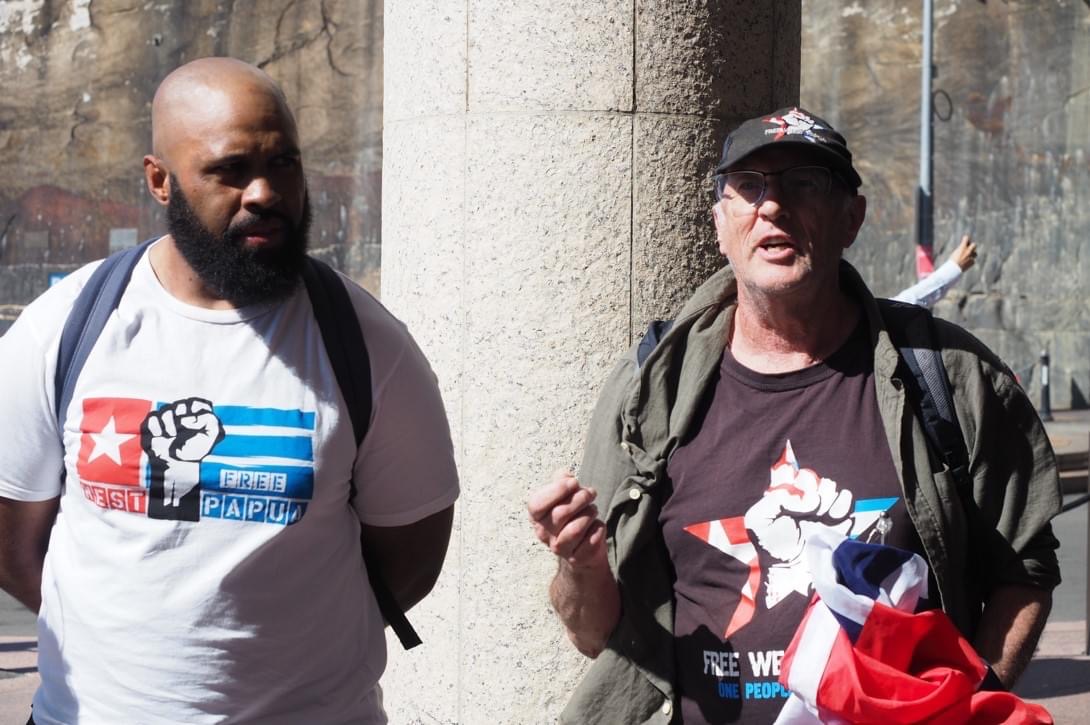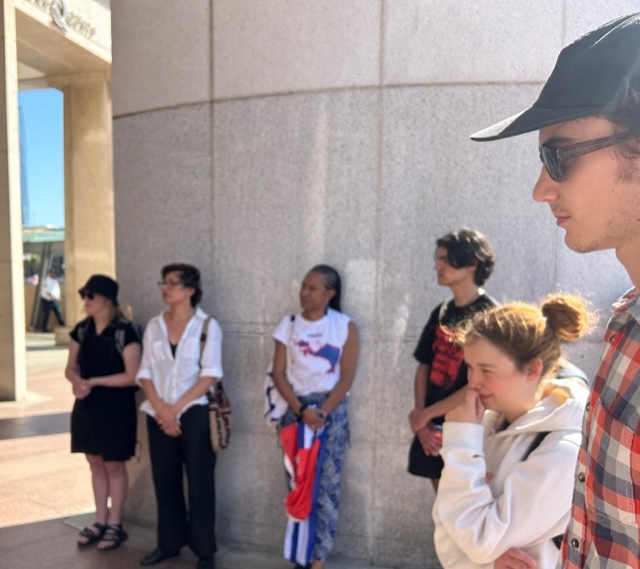More than 100 people marched through the streets of Magan-djin/Brisbane on August 30 as part of a School Strike 4 Climate student strike for West Papua.
“Right now my people, the people of West Papua are living through a painful reality,” a message from Papuan activist Jeffrey which was read to the crowd said.
“We face violence, discrimination and an ongoing struggle just to have our rights recognised,” the message said.
The colonising Indonesian state denies the people of West Papua their rights to self determination, to raise their own Morning Star flag, and to speak freely since what Papuans describe as an “Act of No Choice” in 1969.
Environmentally and socially destructive mining and forestry operations are bitterly opposed by local people.
“When we look for the freedom to make our own choices and protect our own lands, we are often met with military force and the silence of the world,” the message said.
“We must raise our voices, demand justice and stand against this oppression.”
The action took place in defiance of an attempt by Instagram to silence the organisers when their Instagram page was shut down earlier this year.
This action was one of 30 strikes for West Papua around the world on the day.
See more photos on the Green Left Facebook page.
Indonesian president-elect Prabowo Subianto was in Canberra early last week to meet with soon-to-be counterpartprime minister Anthony Albanese and to further negotiate a new defence deal, in his current capacity as Indonesian defence minister with our own defence minister Richard Marles.
Albanese told the press on 20 August that he was pleased to announce our nations’ bilateral treaty-level Defence Cooperation Agreement had been completed that day, which marks the strongest ever defence ties between the two nations, which will ultimately strengthen interoperability.
Of course, if the name Prabowo Subianto, who’s to take over as Indonesian president from Joko Widodo in October, rings a bell, it’s likely in relation to the command role he used to play in the Indonesian military’s Kopassus, the nation’s special forces, in regions like East Timor and West Papua.
Prabowo has the reputation of being Indonesia’s greatest human rights violator of current times. But that didn’t prevent former Australian defence minister Peter Dutton from gifting his then Indonesian counterpart 15 Bushmaster military vehicles in 2021, some of which have turned up in West Papua.
Indeed, after Prabowo took out this year’s February election, United Liberation Movement for West Papua president Benny Wenda warned that “the butcher of East Timor” taking top office signalled a ramping up of the militarised occupation of West Papua, which has been on the rise since 2018.
AU-kosy
At last week’s Canberra negotiations over the defence treaty, both Albanese and Prabowo gave short statements, but questions were not allowed, while Marles went on to sign off on the Indonesia-Australia DCA at the Indonesian Military Academy in Magelang, Central Java on Thursday, 29 August.
Prabowo stated on Thursday that it was the most significant agreement between the neighbouring nations since the Lombok Treaty of 2006, especially as this DCA is the first such legally-binding agreement, which is due to the enhancing nature of military cooperation between nations.
So, in terms of negotiations, it’s unlikely that Australia pressing Indonesia on its presence in West Papua was on the agenda, especially as Australia’s overt support for Israel over the past 11 months would undermine any such efforts.
Marles explained that the agreement, which remains unpublished, was not a military alliance but rather “an important piece of international architecture” that includes the two nations partaking in joint military exercises beginning this November.
The defence minister further flagged that in this time of build up towards war with China this “non-alliance” agreement would cover “areas such as maritime security, counterterrorism, humanitarian and disaster relief, logistics support, education and training, as well as across defence industry”.
On his way back to Jakarta last week, Prabowo paid a visit to Port Moresby to speak with Papua New Guinea PM James Marape, and a controversy stirred after a West Papua journalist was barred from a presser, which featured Prabowo suggesting PNG might advise him on Melanesian customs.
And while relations along the border between PNG and Indonesian-run West Papua continue to be a source of friction, deals cut last year between Port Moresby, Canberra and Washington in regard to the Lombrum Naval Baseplace the Melanesian nation firmly within the AUKUS sphere of influence.
West Papuan president-in-exile Benny Wenda condemned the PNG meeting with Prabowo, warning that “Melanesian leaders cannot trust this dangerous war criminal”, as while the former general “may speak softly… he is complicit in genocide”.
“Tens of thousands of West Papuans and East Timorese were killed under his jurisdiction while he was a Kopassus commander,” Wenda added on 23 August, ahead of this week’s Pacific Island Forum. “He is directly complicit in numerous massacres and has never repented or faced justice.”
Around 100,000 West Papuans have been internally displaced since Jakarta began its current crackdown in the region in 2018. This began in Nduga regency, after 19 Indonesian construction workers who were building the controversial Trans-Papua Road project were killed by local militia.
Armed liberation forces have been operating in West Papua ever since the United Nations handed Jakarta control of the Melanesian region in 1963, as the Netherlands was vacating its colonial rule of Indonesia. But this was on the proviso that a West Papua independence referendum was held.
In 1969, the UN brokered Act of Free Choice took place, which involved the Indonesian Army selecting 1,026 West Papua people to vote in what should have been a whole-of-community decision, and all of those who voted at gun point chose to stay with Jakarta.
This week, the ULMWP was calling on the Pacific Island Forum to reaffirm its 2019 call for the UN High Commissioner for Human Rights to visit West Papua, with the ultimate goal being that a new internationally supervised national vote on self-determination takes place.
Indeed, in January 2019, ULMWP president Wenda presented the West Papuan People’s Petition to the UN, which is a document calling for a new referendum. And this has been signed by 1.8 million West Papuans, which accounts for around 70 percent of the Indigenous population.
The ULMWP has long been pushing for full membership for West Papua in the Melanesian Spearhead Group, and in the early 2020s, it succeeded in bringing together disparate groups to form a West Papua provisional government, which operates inside of West Papua, as well as abroad.
“A sick joke”
Wenda warned last Friday that as the incoming president has been cosying up to neighbouring countries, like Australia and PNG, over recent weeks, extrajudicial killings have continued to take place in occupied West Papua.
And he added that Prabowo travelling to Papua New Guinea to suggest that the PM there might assist Jakarta in “defending our culture and protecting our rights, is a sick joke”. And as for West Papuans the new leader of the occupying force will always be a Kopassus strongman general.
“Prabowo is a killer of Papuans and, through his family’s mining and palm oil interests, a destroyer of Papuan land. He should not be welcomed by Papuans,” Wenda made clear in his 23 August statement.
“Prabowo’s propaganda tour is simply a distraction,” the locally recognised president of West Papua continued.
As President of the ULMWP and on behalf of the people of West Papua, I welcome the Pacific Islands Forum (PIF) Communique reaffirming the 2019 call for a UN High Commissioner for Human Rights visit to West Papua:
Leaders recalled their decision from 2019 and 2023 and noted the update from the Special Envoys.
The 2019 call was a historic moment for Pacific support for West Papua. Pacific leaders stood up for their Melanesian family by demanding Indonesia be investigated for their crimes in West Papua. West Papuans everywhere will be encouraged to see that Pacific solidarity and support renewed. You are giving us courage in our struggle.
I thank all those Melanesian and Pacific leaders who played a role in this communique, particularly Prime Minister Salwai of Vanuatu, who was so influential to the original 2019 UN call. I also welcome PIF’s reaffirmation of the 2023 call for MSG Special Envoys to visit West Papua, and hope that visit will happen soon and in harmony with the UN Human Rights visit.
The Pacific and West Papuan struggles are deeply connected: the destruction of the Papuan rainforest by the Indonesian state and international corporations directly undermines the Pacific fight against sea level rise. You cannot fight climate change in the Pacific without fighting ecocide and genocide in West Papua.
After five years of delays and refusals, with more than 100,000 West Papuans displaced and over 1000 killed, now is the time for Indonesia to finally let the world see what is happening in our land. They cannot hide their dirty secret any longer.
Benny Wenda
President
ULMWP
----------------------













